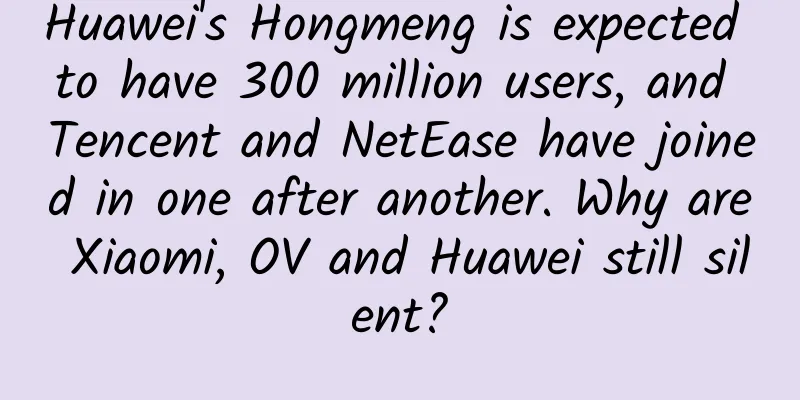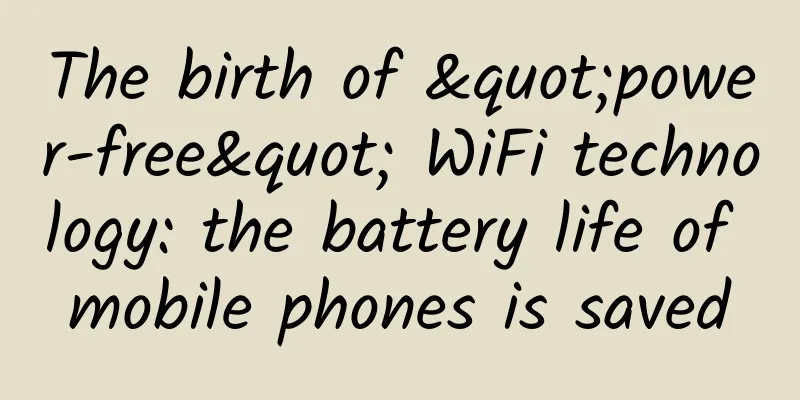Huawei's Hongmeng is expected to have 300 million users, and Tencent and NetEase have joined in one after another. Why are Xiaomi, OV and Huawei still silent?

|
At the Huawei Developer Conference not long ago, Huawei Hongmeng 3.0 was officially released. From 1.0 to 3.0, from being questioned to gaining a firm foothold, from system to ecosystem, Hongmeng has proved itself with its achievements step by step. What is even more gratifying is that Hongmeng has broken through the narrow concept of "mobile phone operating system" and stood on a higher level, connecting mobile phones, computers, tablets, TVs, car equipment, smart wearables and other connected things. In the future, the ecosystem created by Hongmeng may completely subvert our lifestyle. High-level vision and strong purpose. According to Richard Yu, Huawei's executive director, CEO of its consumer business, and CEO of its intelligent automotive solutions BU, the number of Hongmeng system users has reached 150 million. According to the expected progress, by the end of 2021, the number of devices equipped with Hongmeng will double to 300 million. However, on the one hand, Huawei's Hongmeng is advancing by leaps and bounds and is being promoted in full swing, while on the other hand, there is collective silence among domestic competitors. Now, nearly two years have passed since the official release of the HarmonyOS. During this period, only Huawei has continued to promote HarmonyOS in the domestic market, while no mobile phone manufacturers, including Xiaomi, OV, have expressed their intention to connect to HarmonyOS. Why is this? Realistic considerations and time experienceThere are many mobile phone models among major manufacturers. Huawei alone has hundreds of new and old models, with more than 500 million mobile phones in use. Currently, Hongmeng is only pushed within Huawei and some Honor phones. However, there is almost no technical verification to support whether Hongmeng can perfectly adapt to various models of friendly manufacturers and whether it can support the operation of all mobile phones. On the other hand, the stability of the Hongmeng system still needs time to be tested. Among the 300 million devices that have been adapted so far, the user experience is severely divided. In the Android system, various functions have been optimized to the greatest extent, and the user experience has been greatly improved. However, due to time constraints, Hongmeng still has more room for improvement. In this case, it is indeed a problem for manufacturers to fully accept Hongmeng. After the release of Hongmeng system, who is actually accessing Hongmeng has attracted much attention from the market. So far, Huawei's cooperation with many industries has made significant progress. More than a thousand hardware companies in the automotive, furniture and financial industries have jointly built the Hongmeng ecosystem. The two Internet companies that have attracted the most attention from the market are NetEase and Tencent, which recently announced that they will also connect to Hongmeng. NetEase Cloud Music and QQ Music have taken the lead in entering the Hongmeng sequence. Although the advancement of Hongmeng seems to be quite effective, it has not yet reached a deeper level of cooperation. Looking at the manufacturers that have announced their access to Hongmeng, we can find some phenomena: 1. Only some products are connected. For example, NetEase currently only connects to NetEase Cloud, Tencent only connects to QQ Music, and Meizu only connects to cooperation in the field of smart ecology. So at present, it seems that the companies are testing the waters. 2. Access products for other industries are built on the existing user base of HarmonyOS and do not increase the overall user scale of HarmonyOS. 3. The manufacturers that Huawei has currently cooperated with have no competitive relationship with Huawei, so their persuasiveness is poor and there is no strong and clear support from friendly competitors in the same industry. In other words, although the relevant cooperation of Hongmeng is now very powerful and the media are competing to report it, the substantive promotion of Hongmeng has always mainly relied on Huawei itself. Interest considerations and strategic needsBenefits, benefits, benefits. This is the most important point. We try to analyze it in three dimensions: 1. The distribution of benefits needs to be reconsidered. The Android system is open source. Major mobile phone manufacturers have a certain amount of independent research and development space when developing on this basis. It is precisely this space that can be used that forms a huge disposable space. For example, the waterfall flow, advertising space, and pre-installed software in the mobile phone can generate revenue. Another example is the APP recommendation position in the app store, and the joint operation of games between mobile phone manufacturers and game developers. These revenues will occupy an important part of the mobile phone manufacturers' revenue. Therefore, if mobile phone manufacturers are allowed to access Hongmeng, the distribution of benefits will inevitably have to be reconsidered. 2. It is difficult to segment and develop user groups and maintain user brand loyalty after accessing HarmonyOS. At present, manufacturers have their own "fan clubs". Manufacturers use their own cloud services to analyze users and continuously carry out personalized news promotion and product marketing. This is a very convenient way to maintain customers. Once connected to Hongmeng, if these services are required to be castrated, it will be tantamount to cutting off the source of funds for mobile phone manufacturers. 3. It is difficult to give up the overseas market. Xiaomi, OV and other three manufacturers occupy a considerable scale in the overseas mobile phone market, and their overseas operating income accounts for as much as 50% of their total revenue. Taking the Southeast Asian market as an example, as of the end of 2020, OPPO's market size in the Southeast Asian market alone reached 22.2%, ranking first, Huawei ranked third with 13.1%, and VIVO followed closely with 12.7%. Apps released on overseas Android platforms are heavily dependent on GMS (Google Mobile Services), which is a product unique to Google. Overseas, many apps are very dependent on GMS services; if all of them are launched on the Hongmeng system, it means that domestic mobile phones will lose overseas markets, which is undoubtedly an unimaginable thing. So, is it feasible for Hongmeng and Android systems to run in parallel? The answer is no, because all manufacturers have been required by Google to sign an anti-split agreement. This agreement is mainly aimed at maintaining the stable operation of applications within the Android system, and its premise is that self-developed application layers and programs cannot be used to replace certain parts of Android without authorization; if it is determined that running the Hongmeng system will have obvious and serious compatibility issues, once it affects the operation of Android, then Google will take various measures. In short, all manufacturers are rushing to launch HarmonyOS, and the time is far from ripe. This is not something that can be influenced by "patriotism". We can wait for HarmonyOS to continue to grow and wait until it can meet the needs of overseas users well. By that time, perhaps we will wait for Xiaomi, OV and other friendly companies to embrace HarmonyOS. As a winner of Toutiao's Qingyun Plan and Baijiahao's Bai+ Plan, the 2019 Baidu Digital Author of the Year, the Baijiahao's Most Popular Author in the Technology Field, the 2019 Sogou Technology and Culture Author, and the 2021 Baijiahao Quarterly Influential Creator, he has won many awards, including the 2013 Sohu Best Industry Media Person, the 2015 China New Media Entrepreneurship Competition Beijing Third Place, the 2015 Guangmang Experience Award, the 2015 China New Media Entrepreneurship Competition Finals Third Place, and the 2018 Baidu Dynamic Annual Powerful Celebrity. |
<<: Which Apple iPhone 6/6 Plus naked phone is the most worth buying?
>>: Apple's high-profile launch of smartwatch is a blessing in disguise for Samsung
Recommend
[Longtou Taishan] "Longtou Daily Limit Code Course and VIP Information" Market Sentiment Strategy PDF Article
【Longtou Taishan】"Longtou Daily Limit Code C...
Flip phone is not dead: Samsung's 10,000 yuan "killer" is actually endorsed by him
Just as Zhang Yimou's art blockbuster "Co...
Detailed introduction to Shenma search promotion account operation
1. What is the structure of a Shenma promotion ac...
iOS uses Charles (Blue and White Porcelain) to capture packets and tamper with returned data
The motivation for writing this article was that ...
The past, present and future of private domain traffic!
one The concept of private domain traffic should ...
BMW's new 6 Series Coupe will be equipped with a 2.0T engine: Who cares about power at 7 liters per 100 kilometers?
In recent years, models such as the Porsche Panam...
10 billion live bacteria, there are indeed so many in the drink, but how many of them enter the intestines?
Sometimes, stomach discomfort may be caused by an...
Throw a bucket of cold water on foldable screen phones. They really won’t be popular this year.
The development of science and technology is gett...
Self-destructing mobile phone trial production completed: processor chip melts in seconds
There are often scenes in spy movies where cell p...
The Spring Festival was successfully nominated for World Heritage, but “they” are arguing! Who should be credited for this achievement?
The Spring Festival has become a hot topic even b...
Zhang Chaoyang: Sohu Video will take over the PGC banner
"There are always big things about to happen...
Baidu bidding promotion strategy formulation method
Whether it is SEO or SEM bidding paid advertising...
Fainted in the toilet: 60% of Internet practitioners earn less than 6,000 yuan a month
[[134144]] "Working is so tiring, I don'...
Featured | How do major brands write Father’s Day copy?
Father's Day, as the name suggests, is a holi...
Transformed into a "screenless TV", can smart projectors project the future?
Taking advantage of the demand for watching footb...









